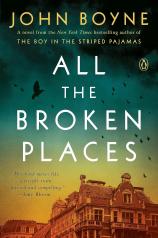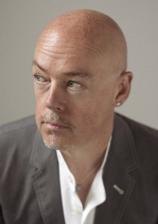All the Broken Places
Review
All the Broken Places
One of the benefits of writing for Bookreporter is the diversity of books that are available for review. I have my likes and dislikes, but each month there are a wide variety of subjects and authors from which to choose. Some are obviously well-known and recognizable, but often there are writers I get to experience for the first time.
In 2018, A LADDER TO THE SKY by John Boyne caught my eye, and I requested to review it. It was a spectacular story that I recommended to many and included on my “Best Books of the Year” list. Since then, I have returned to Boyne and read several of his other books. He is an inviting and compelling author whose stories will make readers both laugh and cry. His novels are beautifully constructed, and they flow with elaborate precision.
"Gretel Fernsby’s story exposes readers to issues of atonement and whether or not violence can ever be justified. It accomplishes those tasks with the skill of a novelist, which is often lacking in the less emotional pages of nonfiction."
Boyne may be best known for THE BOY IN THE STRIPED PAJAMAS, a Holocaust novel written for young adults that released in 2006 and became a bestseller. Eventually it was made into a movie, as well as a ballet and an opera. It received mixed reviews from historians, some of whom attacked its authenticity. Boyne tells us that immediately upon completing it, he began making notes for ALL THE BROKEN PLACES. While it’s not truly a sequel, there is a connection between the two books based on its subject and themes. They both deal with guilt, accountability and the grief that results from world-shaking tragedy.
Gretel Fernsby is a 91-year-old widow residing in a wealthy area of London. Despite her age, she lives alone and enjoys a comfortable life in a well-appointed apartment near Hyde Park. Her life seems uncomplicated; she has a few friends living in her building, and her son is also in London. But Gretel has a secret past that slowly will be revealed. It begins in pre-war Nazi Germany, moves to post-war France, and has a stop in Australia before her final years in London. For her, it is a life of shame, guilt and self-preservation. Little by little, the details of her earlier life are exposed.
When the apartment below Gretel becomes vacant, a new family moves in, and she reluctantly befriends nine-year-old Henry. As she spends time with them, it becomes clear that Henry and his mother are the victims of domestic abuse. Gretel must decide how and even if she will respond to what she observes. Once again facing evil and brutality, how will she act?
Holocaust literature must do more than tell a story. It has an obligation to reflect on the moral consequences of the event and the responses (or lack thereof) by those who choose inaction over action. Boyne’s treatment of the Holocaust has been criticized, and there have been some less-than-favorable reviews of ALL THE BROKEN PLACES. I will leave that debate to others as my experience with Holocaust-themed writing is mostly in nonfiction.
Boyne obviously believes that writing about the darkest parts of human nature serves a purpose. Gretel Fernsby’s story exposes readers to issues of atonement and whether or not violence can ever be justified. It accomplishes those tasks with the skill of a novelist, which is often lacking in the less emotional pages of nonfiction.
Reviewed by Stuart Shiffman on December 9, 2022
All the Broken Places
- Publication Date: November 28, 2023
- Genres: Fiction, Historical Fiction
- Paperback: 400 pages
- Publisher: Penguin Books
- ISBN-10: 0593653440
- ISBN-13: 9780593653449




